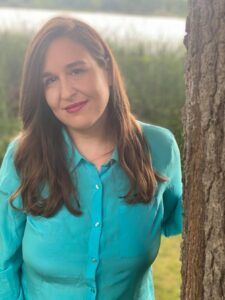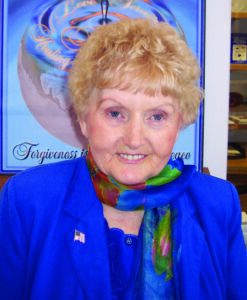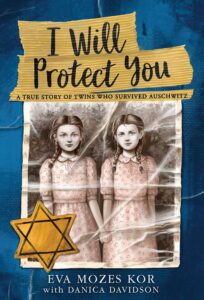I am pleased to welcome Danica Davidson, the coauthor of the middle grade memoir I WILL PROTECT YOU: A TRUE STORY OF TWINS WHO SURVIVED AUSCHWITZ (Little, Brown Books for Young Readers, 2022) written with her friend, the late Eva Mozes Kor. I WILL PROTECT YOU tells the life story of Eva and her identical twin sister, Miriam who at ten years old were subjected to the horrors of Dr. Mengele and the Nazi regime at Auschwitz. Despite the circumstances, Eva maintained a sense of hope and forgiveness. Although she passed away before the book’s release, Eva’s memory will live on through this unforgettable story. I WILL PROTECT YOU is a harrowing and important read. It’s an honor to learn more about Danica, her relationship with Eva, and the book they created together.
I WILL PROTECT YOU is a middle-grade memoir you wrote with Eva Mozes Kor. Tell me a bit about how you came to learn of her story and partner with her for this project?
An email popped up one day from my temple saying that a Mengele twin named Eva Mozes Kor was going to be giving a speech at a university about an hour from me. I was immediately interested in what I could learn from Eva. I’d experienced more antisemitism recently, and I felt a need to do something about it, to educate people. I wasn’t sure how, but I figured the first thing I needed to do was educate myself more, and that included reading more Jewish books and seeing Jewish speakers.
I’ve met Holocaust survivors before, but I’d never met one who’d survived Auschwitz as a child. So I went to the speech with my significant other, and introduced myself to Eva afterward, hoping I could interview her for a magazine. But as soon as I mentioned I’d written children’s books, she was about out of her seat. She exclaimed she wanted to write a children’s book about her story. She said we needed to reach kids, because if we wait until they’re twelve or older to talk about the Holocaust or antisemitism, it’s too late because the prejudices are already formed.
It seemed like the perfect fit: I was trying to find a way to educate people on antisemitism and here was a once-in-a-lifetime opportunity to write a children’s book about surviving Auschwitz from a real child’s point-of-view. And Eva wanted someone who knew how to write for children to tell her story, and so far she hadn’t found a writer she thought had the right style and voice for it.

Eva and her twin sister experienced the most horrific atrocities. How did you distill these experiences for your middle-grade readers?
There are a few things that helped. One, I’ve published eighteen books for young people, mostly in middle grade, so I’m comfortable with the voice and range. Two, my dad taught me all about the Holocaust when I was in elementary school, so I remember how I was taught at an age-appropriate level; I remember the language he used and the details he gave. He didn’t give me graphic details, but he didn’t sugarcoat it, either. Three, Eva was the age of middle grade readers, so the book is one child talking to another.
I also made a general rule that details went into the book if Eva witnessed them herself, or if they’re needed to understand the context of the Holocaust and what was going on around her. So, for instance, I explain the goal of the Final Solution, the existence of gas chambers, and that six million Jews were murdered, because you need to know these details for context. I do not describe what it would be like in a gas chamber, the worst of Mengele’s experiments, or all the ways the six million Jews were killed.
In addition to Eva’s first-hand account, what kind of research did you need to do?
I had been reading a lot of Jewish books already, including some Holocaust books. There was already a lot of information roiling around in my head that I thought it would be good for more people to know. Some of that went into the book.
During the revision stage, I also shared the manuscript with Michael Berenbaum, who’s considered the world’s premiere Holocaust scholar, to get his take. He had a few suggested tweaks, and then he endorsed our book.

How is the process of writing a memoir different from the other books you have written?
Most of my books have been fiction, so it’s where my imagination takes me. With this, I’m working with facts, so I can get creative in how I dispense those facts, but I can’t make anything up. Everything needed to come from Eva or another credible source.
The cover art for I WILL PROTECT YOU is chilling and beautiful. What were your thoughts when you held the finished book in your hands?
It was surreal. Eva had died fifteen days after we accepted Little, Brown’s offer on the manuscript while on an education trip to Auschwitz, and when we were working on our book I’d always pictured us together when it was published. It was very bittersweet to not have her here with me.
I kept saying, “We did it, Eva, we did it. In spite of everything, we did it.”

Did working with Eva and writing I WILL PROTECT YOU change your own views about loss, healing, and forgiveness?
Forgiveness wasn’t something I thought about much before. Eva had an interesting take on it. For her, forgiveness meant healing. It didn’t mean pardoning someone or forgetting something. It meant she no longer allowed the hate to eat her up because it was hurting her and no one else.
Some people have misunderstood and misconstrued what she meant by this. I don’t know if Eva ever thought of it this way, but her talk of not letting anger eat you up reminds me of Stoic philosophy. Like when Marcus Aurelius said: “You have power over your mind – not outside events. Realize this, and you will find strength.”
Eva didn’t have control over whether or not Mengele was caught and brought to justice. Unfortunately, he wasn’t. She did have control over her feelings, and she felt like he was no longer her master when she wasn’t eaten up with hate for him anymore. I think this is a very powerful message not to let others control you.
There can be a downside to forgiveness. Since working on this book with Eva, I’ve met some people involved in forgiveness activism who use key words to act virtuous in public, but behind the scenes they’re different people. And they act as if they can get away with anything because then they can just say, “Well, you have to forgive me.” It doesn’t work that way. Forgiveness is supposed to be about healing for the survivor, not for the abuser to deny any responsibility for their actions.
Some very difficult things have happened in my life since working on this book, and I’m finding my own ways through loss and healing. Sometimes I think about the strength Eva had to get me through.
Thank you, Danica. May Eva’s memory be a blessing.
The late Eva Mozes Kor founded the CANDLES Holocaust Memorial Museum and Education Center in memory of the twins Mengele murdered, to teach about the Holocaust, and as a testament to the power of forgiveness. She was a community leader, champion of human rights, and tireless educator. A frequent public speaker, Eva was also the subject of a PBS documentary about her life.
Danica Davidson wrote I Will Always Protect You with her friend, Eva Mozes Kor. Danica is the author of sixteen books for children and young adults.